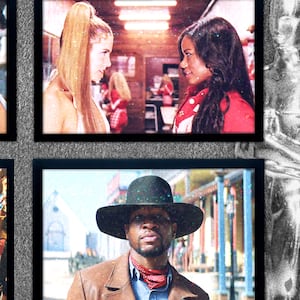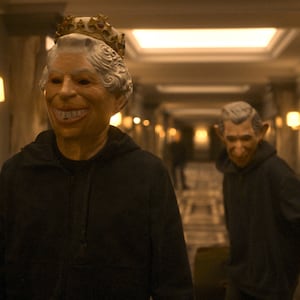The TV series Inventing Anna is either about an enigmatic con artist who scammed her way into elite social circles and allegedly swindled millions of dollars in clothes, luxury trips, and massive loans from some of the most powerful people and financial institutions in the world, or it is the harrowing, yet charming story about the first alien to ever walk among us on Earth.
The journey to discover which is an, at turns, incredible yet interminable ride. It’s a binge-worthy trip. It’s a befuddlement. It’s unclear if anyone involved in this new series, from Shonda Rhimes and dropping on Netflix Friday, had clear direction. But also, too, maybe that’s the point. It’s also unclear if Anna did herself.
Anna Delvey, also known as Anna Sorokin, posed as a German heiress and leveraged the legend of her wealth to facilitate her swanning through the life of a 1 percenter, a world that never questioned her or the fact that she never left her credit card while running a tab because of her pedigree/extraterrestrial status.
Her unplaceable European accent—German by way of Russian by way of The Count from Sesame Street—acted as a hypnotizing charm. The passive bluntness of her cruel asides—casual, drive-by dismantling of the ego—reflected the kind of human-adjacent behavior that fascinated and destabilized people, and that allowed her to manipulate people into doing her bidding/transport them to her UFO where she would probe and persuade until they agreed to give her money.
Don’t let this be too misleading. Inventing Anna is not some sort of sci-fi series, and the odds are that Delvey/Sorokin is not, in fact, a Martian. Probably. But she is otherworldly in a way that mystified anyone who had a close encounter of any kind with her, not to mention those who read about her schemes after she was captured in the jaw-dropping New York magazine feature that inspired the new Netflix series and, now, all of us watching it dramatized by none other than Shonda Rhimes herself.
But there is something about the constant refrain that surrounds all things Anna Delvey, both then—“Who is she???”—and now—“How did she get away with it?”—that signifies someone who defies human logic. Couple that with the performance of Ozark Emmy-winner Julia Garner in the role. Garner’s accent is outrageous, purposefully so. So was Anna’s. It’s a marvel of phonetics. She’s an inventor of entirely new vowel sounds; master of an international dialect that hitherto had never even existed.
Delvey was a shapeshifter, but not just aesthetically. Sure, hair is dyed. Wardrobe is tailored to ingratiate her to her next target. But her personality was equally malleable and unpredictable, often at odds with the mood of a room or an interaction. The blurred line of performance and authenticity provided cover for the woman who became known as the “Soho grifter.” A lack of any sort of normalcy was her shield. And, as a TV series, it’s both Inventing Anna’s greatest gift and most insurmountable hurdle.
The appeal of Inventing Anna should be a no-brainer—emphasis on should.
A story this batshit and so tapped into the zeitgeisty obsession with cons and scams is a foolproof formula for a streaming hit. That’s what makes this telling so confusing and, in the end, a bit of a letdown. Perhaps taking a cue from the Anna Delvey phenomenon itself, it has only a superficial understanding of what it should be, or at least what audiences might want it to be. And at every pivotal turn, it seems to be trying on a new identity, all the way up until the bitter end of its unforgivably overlong episodes.
What Inventing Anna gets right is a certain, perhaps crass, appreciation for how wild these grifter stories can be. As the song “Rich” by Meghan Thee Stallion plays, Garner-as-Delvey narrates, “This whole story, this one you’re about to sit on your fat ass and watch like a big lump of nothing, is about me.” That’s how the series begins.
The blizzard of tweets that came after her arrest, flurrying with shock and awe at the details of her case, flash across the screen. A montage of news stories centering on the “Soho grifter” play. The Voice of Anna continues: “You know me. Everyone knows me. I’m an icon. A legend.” “Anna Delvey is a masterpiece, bitches!” “Pay attention. Maybe you can learn to be smart like me. I doubt it. But you can dream.”
A disclaimer—which will run in each episode—plays, indicating that all of what you’re about to see is true, “except for the made-up parts.” The 10 episodes that follow, almost all of which are over an hour in length, recount journalist Jessica Pressler’s reporting that produced the New York magazine article “How Anna Delvey Tricked New York,” flash back to Delvey’s glory days pulling off her social-climbing sleight of hand, and, at its most fictional, push the narrative past the current state of Delvey affairs.
The topsy-turvy details of what Delvey did and the very real, devastating impact it had on those who were all-too-eager to buy into her false, intoxicating, and, most of all, unusual persona never cease to astound. It’s the oft-aggravating slog to get to those revelations that’s the chore—and, frankly, the false promise based on that bombastic, cheeky opening that seemed to telegraph a series a lot more willing to embrace camp than what we’re given.
Much of Inventing Anna isn’t centered on Delvey, but on Vivian Kent, the journalist stand-in for Pressler played by Veep’s Anna Chlumsky. Her once-promising tenure at Manhattan magazine is blemished by, in her mind, an unfair media scandal. A juicy story like Delvey’s is the chance to salvage her journalistic reputation. She’s also very pregnant, so she’s on a deadline to prove herself, a perpetually blowing gasket in contrast to the more assured, flawed heroines that Rhimes has given us in the past, from Meredith Grey to Olivia Pope.
Playing things like a true crime story, with Vivian piecing together how Delvey managed to get away with things for so long, would be fine and should be gratifyingly in-step with the hottest trend in television storytelling. But the portrayal of journalism here leaps to the front of a long line of pop-culture examples that reveal Hollywood has absolutely no idea how journalism works—or, at least, assumes the basest level of intelligence of the reporters worth making content about.

There’s a whole rant to be made about this. The litany of obvious journalistic first steps that are depicted as dramatic eureka moments are absurd. (In investigating a millennial socialite obsessed with how the world perceived her, it doesn’t dawn on Vivian to perhaps start by looking at her Instagram.) Even the way the newsroom environment is portrayed—colleagues frequently abandon their own assignments in order to independently research Anna and provide a treasure trove of breakthroughs to Vivian—is exasperating (a few colleagues said they had to stop watching the series because of this).
But for someone as skilled at lassoing devastatingly emotional, grounded stakes from the outrageous, soapy, and absurd as Rhimes has reliably been, there’s a disconnect between the fantasy lavish life that Anna lived, as we see it on screen, and the labored pursuit to piece together the puzzle of her crimes. This is never successfully bridged in a way that has you invested wholly in either Vivian or Anna, or even fully understanding their respective motivations. Maybe that’s to be expected with Anna, who is meant to be a riddle of a person. Yet it’s strange to flit between the extremes of these two characters and come out feeling so empty about both.
It goes without saying that this is a larger-than-life story, and Rhimes gives it the outsized treatment: a massive production that screams “we got Netflix money!” and, to harp on it again, bloated running times. But maybe the fact that this is actually life somehow hampered things.
In Shondaland, characters had sex with ghosts, murdered hospitalized Supreme Court justices by smothering them with pillows, and demanded to know why your penis is on a dead girl’s phone. These same characters also mined some of the most intimate parts of their humanity to create powerfully universal moments. Inventing Anna buzzes too faithfully along the middle line between those extremes.
Does that matter? Ostensibly, not one bit.
Inventing Anna will be a huge hit that will be voraciously consumed by the massive, dutiful audience clamoring for so much scam-and-con content that it seems a veritable dam has broken in the genre. (The Dropout, Super Pumped, Joe vs. Carole, and WeCrashed are all to come, satiating anyone who’s already made it through every series about the Fyre Festival, LuLaRoe, and swindlers on Tinder that have already launched.)
The series winks at that popularity, with a who’s who of your favorite disgraced grifters name-checked in various episodes, like a celebrity cameo Hall of Shame. The more of these offerings we get and the more big swings at stylish tellings of the central characters’ misdeeds that are taken—not to mention the interplay of the real human impact of these sensational stories with our giddy desire to be entertained by them—the more of a crisis of conscience there’s going to be.
Inventing Anna deals with crucial themes of misogyny, privilege, consumer culture, toxic aspiration, and media sensationalism. But, in the end, it’s as inscrutable as our central alien figure.








